|
|

|
A conversation with Sy Liebergot
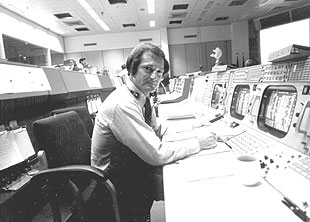
October 28, 2003 -- Until Sy Liebergot penned his memoirs ("Apollo EECOM: Journey of a Lifetime", Apogee Books, April 2003) the story of the "in the trench" flight controller had yet to have been told.
A majority of the books written about the U.S. space program have dealt primarily with the astronauts or have been "top down" accounts, such as seen from the flight director position or the program management.
Liebergot's story was told from 'the bottom up'; describing for the first time controllers' reactions to flight situations; their interaction with the astronauts; and their hangouts, inside anecdotes and jokes.
Simply put, Liebergot gave voice to the individuals whose whole existence was focused on mission success and astronaut safety.
Sy Liebergot recently sat down with collectSPACE to answer questions about his history with NASA and his view on the future of human space flight.
What in your view is the role of Mission Control as it relates to mission success?
Mission Control is the hub of all space mission (in-flight) activity. The planning and execution of mission events occur and are coordinated in Mission Control. Based on the performance of the in-flight spacecraft as analyzed by a team of flight controllers, key decisions are made as necessary to accomplish flight objectives and assure mission success.
How did you find yourself a member of Mission Control?
As I look back over my life, there were subtle influences that steered me into technical interests, that led to decisions to join the U.S. Army to preserve an option to attend college, the experience there leading me to a decision to pursue an engineering degree, which found me working at North American Aviation which became the Apollo Prime Contractor, which took me to Houston, Texas with a position in Mission Control, which allowed me to reach a personal apex as a NASA Flight Controller during the halcyon time of the Apollo Program. The details of this path are told in my autobiography "Apollo EECOM: Journey of a Lifetime."
What exactly does an EECOM do?
To answer this question fully let me quote an excerpt from my book "Apollo EECOM":
"EECOM is an acronym introduced for the Mercury Program. It originally stood for Electrical, Environmental and Communication systems. This historic radio call sign is unique to manned space flight operations.
"The EECOM position in the Mission Operations Control Room (MOCR) in the Mission Control Center is steeped in tradition. Men who sat at the EECOM console during Apollo inherited standards of professional behavior and performance that gave newcomers to the position some pause. Ongoing Gemini flights and the addition of Apollo operations required training of additional EECOMs, subjecting them to a steep learning curve.
"The Apollo EECOM Flight Controller was responsible for the life support systems of the Command and Service Module (CSM), which amounted to roughly half of the systems of that spacecraft. These were the systems that provided all electrical power and its distribution, heating and cooling, cabin atmosphere pressure control, breathing oxygen, cryogenic hydrogen and oxygen for fuel cell electrical power plants, the sequential system that controlled the separation events and the parachutes, and many of the mechanical systems. The EECOM was also responsible for the CSM communications system though Apollo 10, thereafter the responsibility was moved to a new console named INCO. The EECOM position responsibilities became even further diluted on the Shuttle program.
"The Flight Directors historically saw EECOM as a catch-all: if a function didn't fit anywhere, then it belonged to EECOM. An EECOM was willing to take responsibility for situations or anomalies not claimed by anyone else. 'That's yours, isn't it EECOM?' was a common Flight Director query. Consequently, an EECOM was required to develop a broad understanding of the spacecraft systems and their operation."
How accurate a portrayal was Clint Howard's portrayal of you in the "Apollo 13" film?
This is a question that I'm frequently asked. Aside from the dark glasses he wore in the film, Clint and I do not resemble each other in the least. Clint's performance in Apollo 13 was most creditable, albeit small. Let me again quote an excerpt from "Apollo EECOM" that will give you an insight into Clint:
"One day I received a call from Clint Howard who informed me that he would portray me in the movie, and he wanted to make sure that he really got 'into character'. I asked him if he had read either Cooper or Murray and Cox's books, if he had viewed the PBS Apollo 13 documentary, and listened to my console audiotapes; he had indeed. I was impressed and we began a series of lengthy telephone conversations. We became good friends as a result of the movie involvement; to this day Clint will occasionally ask me if his performance was okay. As the filming drew near, Clint asked me if it would be all right to use my name in the movie, and I was taken aback that they might not. I replied, 'Clint, I would be honored if you guys used my name in the movie. I would be disappointed if Ed Harris, who brilliantly played Gene Kranz, at a moment of high tension, called me 'Lou''.
"We both had a good laugh over that, and so 'Sy', it was."
Did you ever want to fly yourself? Were you ever jealous of the astronauts?
No, never had the urge be a pilot, let alone go into space. Guess I'm just chicken -- no doubt in my mind that the astronauts, cosmonauts, and now taikonaut, are very brave people. It was thrill enough to be a flight controller, sitting at my EECOM console in Mission Control.
What do you do today?
I am currently employed by Spacehab Inc. as a Senior Configuration Management Analyst for the International Space Station (ISS). In this capacity I am responsible for tracking equipment that is installed and /or removed on-orbit on the ISS. So part numbers, serial numbers and the location of installed hardware become very important. The challenge has been to discipline the ISS astronauts of the importance of those data. I am also required to be at a engineering console in Mission Control whenever the Shuttle is docked to the ISS in order to monitor crew activities with the hardware. So I'm back to wearing a headset, once more.
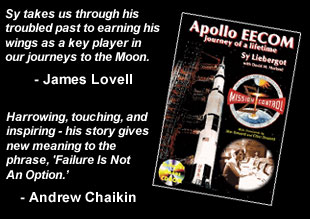
Why write a book?
There were several reasons for writing "Apollo EECOM." For my family, I wanted to tell the full story of my life of poor beginnings with great disadvantages, a situation precipitated by a father who was a lifelong gambler and my life as I struggled with the decisions for the future. Importantly, 60% of the book deals my experiences as a flight controller in Mission Control during our nation's Apollo Lunar Landing, Skylab and Apollo-Soyuz programs. I have been gratified to see the book resonate with readers at both an inspirational level and a techno-anecdotal level. As a matter of fact, I have received letters from parents that say that they have made my book mandatory reading for their pre-teens and teens. Finally I wanted to depict what it was like to be a soldier flight controller in the trenches during that wonderful space traveling time.
Coinciding with the publication of this interview, Liebergot partnered with buySPACE to offer the only remaining original recordings of the Apollo 13 accident, part of his personal collection since the 1970s.
Regarding the tapes, how did they come to exist?
Again, let me quote an excerpt from "Apollo EECOM" for a complete explanation:
"The Cortwright Committee was formed and convened to conduct an investigation into the cause of the Apollo 13 incident and to make recommendations. In the expectation of being called to testify, I had the voice recording station in the Mission Control Center immediately make me a tape of all the intercom loops that I had activated on the EECOM console, covering the period of time from just before the tank explosion to the ultimate loss of all oxygen and power, approximately three hours later. However, much to my relief I was not called to testify. I dropped the two slim boxes containing the open-reel tapes in a drawer of my desk where they remained undisturbed for 18 years. (Yeah, so I don't clear my desk out very often; who does?)
One day in 1988, I received a phone call from a writer who introduced himself as Charles Murray. I had no idea who he was, but that was my failing, because he had a PhD in Political Science from MIT and was a best-selling author. He told me that he was in the final stages of a five-year project to write a book about our space program period up to the landing of men on the Moon, and that every time the subject of Apollo 13 arose, my name came up. He made a decision that he'd better talk with me before wrapping up the project. I invited him up to my office and we talked for about an hour before I recalled the existence of the tapes. I agreed to let him have them dubbed to standard cassette tapes. When he returned the next day with the tapes, I asked him if he had listened to them and he replied with wide eyes, "Holy shit! That was really something!" When I told him that I had listened to the tapes only once in 18 years, he said I should listen to them again. I have, but only once more. He then wrote an additional Chapter 27, based on those tapes, for his book Apollo: The Race To The Moon."
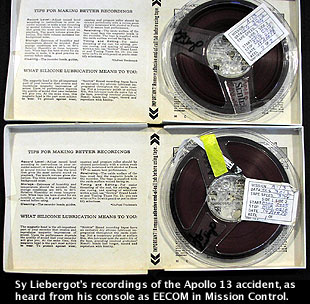
What happened to the masters from which your tapes were duplicated?
In 1994, as part of the research for the production of their epic documentary entitled, Apollo 13: To The Edge And Back, PBS located the Apollo 13 Mission Control master voice tapes in the archives, but the four boxes were empty. Despite an exhaustive search by PBS and JSC Taft Broadcasting personnel, the tapes could not be located and to the best of my knowledge remain lost. The conjecture is that they were probably taken by some media-type producing a space documentary. Ironically, the 24-track tapes can only be played on a unique tape player; the only one in existence is at JSC.
Briefly describe what can be heard on the two reels.
These tapes contain the voices on the intercom loops on my EECOM console during the four hours from the explosion of O2 Tank 2 to the depletion of the remaining, leaking O2 Tank 1, which resulted in the loss of all power to the CSM. They now are the only 'near original' tapes of the masters and all that remain of the Apollo 13 Mission Control communications.
Why did you hold on to the tapes after leaving the MCC?
After I went on to other duties at JSC, I just packed them up each time I moved to another location. At some point in time I moved all my space memorabilia home.
Why sell them now?
Since my children are grown and really don't have a genuine interest in my memorabilia, I recently made a decision to sell most of my space memorabilia. Hopefully, these tapes will find a good home and thereby be preserved. And since, after 33 years they are still playable, they will provide a unique thrill for a future space historian.
Click here to learn more about acquiring Liebergot's Apollo 13 EECOM audio reels.
What is your opinion of Mission Control today?
This is a bit of a loaded question; it's all so different than the earlier days of flight operations. The Shuttle spacecraft systems responsibilities are spread out among more people, due in part to the systems' greater complexity. Gone are the people that you could point to as characters or icons, now replaced with a finely honed, factory-like operation. Bo-ring...
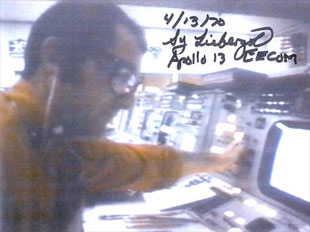
Do you believe the Columbia tragedy was preventable? Would your MCC have acted differently?
In my opinion, both the Challenger and Columbia tragedies were preventable. The signs were all there that significant problems were occurring. With Challenger, it was a booster being towed back into port with black soot painted down its side, originating from a field joint. It was ignored.
With Columbia, it was the multiple times that the Orbiter was struck with chunks of foam from the external tank. It was ignored. An engineer friend of mine who has been a part of our space programs since Gemini, told me with regard to the Challenger and Columbia disasters, that "a spacecraft will talk to you, and you'd better listen when it does." Both of those spacecraft were talking loudly, but few people were listening.
My MCC would most certainly have reacted differently. As Gene Kranz has been recently quoted, "He contended" the NASA of yesteryear would not have allowed the Columbia accident. The system would have fixed the recurring launch problem of breakaway fuel-tank foam". He also said that" these people are professionals. They're being paid a professional wage. If they have a problem, I expect them to stand up and speak up. Period". Contrast this with the NASA now: They're trying to make NASA's shuttle program" a warmer, fuzzier place". Kranz finds the new, soft, mushy approach" distasteful -- and flat-out wrong". Unfortunately, they just don't understand how we did business back then.
What do you think the United States should be doing in space?
NASA should be given a mission, as was the case with "landing humans on the Moon within the decade." It can be argued that when the Apollo program was canceled, since NASA was created to accomplish a large project, it should have been given another or disbanded. Neither happened, so it cast around to survive, as any bureaucracy would and the result was Skylab and the Apollo-Soyuz projects. The early concept of a space station was that it would be a transportation node as well as an orbiting laboratory. Upper stages would be assembled and provisioned on-orbit and carry on manned missions to the Moon and Mars. 'Way too expensive, so the space station has been reduced to its present "mission," i.e. doing some science and boring holes in the sky.
What do you think of the partnership with Russia and the other international partners to build the Space Station?
I believed that the decision to put the Russians in the "critical path" of the space station was a big mistake. NASA lied to Congress when it assured that Russia was not in the critical path. As I recall, under tremendous budget and political pressure, NASA included Russia under the pretext that "two years and two billion dollars would be saved." Instead, estimates are that NASA lost two years and five billion dollars. Serendipitously, because of the Columbia disaster, we now desperately need the Russians.
What do you think of China's efforts in space?
Initially, I'm tempted to respond, "Ho-hum, done that, got the T-shirt," instead I say "C'mon in, the water's great!" The Chinese are showing a very pragmatic approach to a manned space program and as time goes by there may be something for all countries to learn. Regardless of the obvious involvement of the military (what's new?), I don't believe the U.S. will be galvanized in the least, even if the Chinese land men on the Moon. Right now, it's "a good show" for the Chinese.
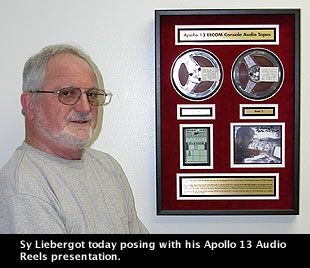
What do you think will be your legacy to space exploration?
Just the thought of being asked this question is humbling. I suppose my book "Apollo EECOM" is my legacy. For in it I have tried to describe what the early days of flight operations were like as I experienced them and coupled with the book CD-ROM "it puts you there." The Apollo era that included the Lunar Landing, Skylab and ASTP programs was a unique time that produced unique people and unique accomplishments. I feel so fortunate that I was able to be a significant part of all that.
|
back to News

© 2023 collectSPACE.com All rights reserved.
Questions? E-mail [email protected]

|
|

|

|
